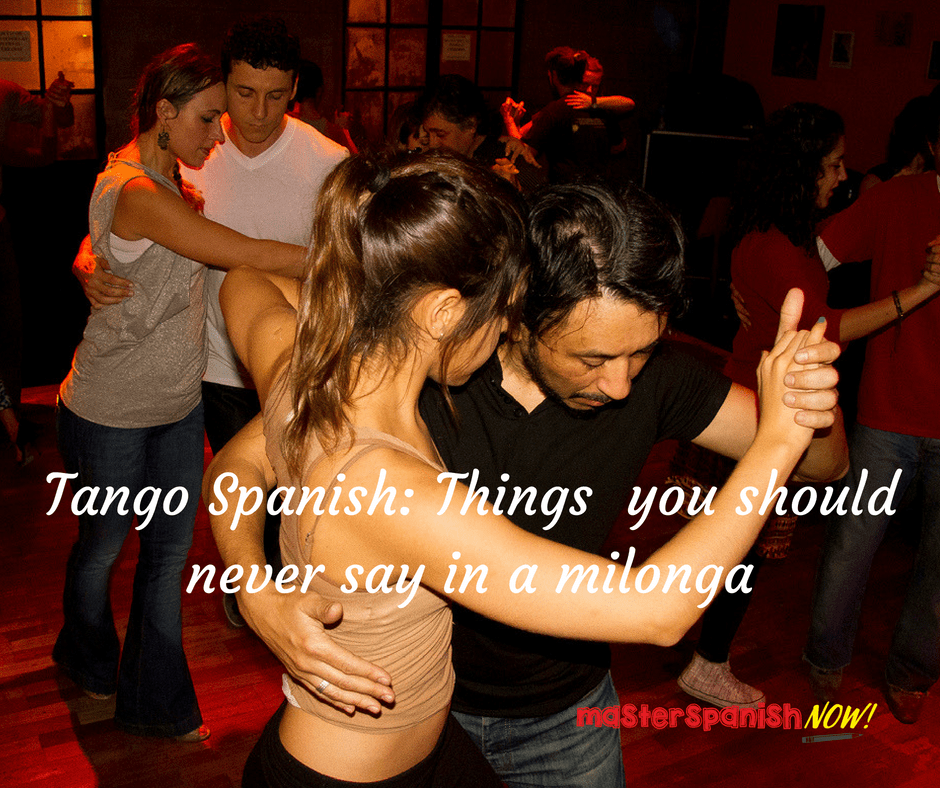Photo credit: (Flickr) Gobierno de la ciudad de Buenos Aires.
When we’re going to a milonga we all want to get along and have a good time, but in a Buenos Aires milonga there are certain things you should avoid saying at all cost. Some of these are related to milonga etiquette; others are some Spanish words which carry a double meaning-usually with sexual connotation. You may at best make yourself look funny, or at worse offensing a fellow tanguero/a unintentionally!
1.Commenting on your partner’s techniques in a milonga
Milonga is a place for people to dance socially for pleasure, but not a place for giving or receiving feedback on techniques. Try to restrain your urge on making a negative comment or giving feedback on your partner’s dance technique, or you may ruin one’s night. Save the feedback for class/practica time!
There’s a saying that in Buenos Aires, if a woman wants to prevent a man from inviting her to dance again, the most effective way is to teach him while dancing with him in a milonga.
If you feel uncomfortable dancing with your partner because of problems in techniques (e.g. a painful embrace, twisting your wrist, etc.), you may say “Gracias” which signals to him/her that you want to end the dance and leave the dance floor.
However, it is OK to express your appreciation if you enjoy dancing with your partner. You may say:
Baliás lindo/linda (You dance beautifully).
Una linda tanda (It’s a beautiful tanda).
Un placer (A pleasure).
Bailás muy bien (You dance very well)
2.Concha
Imagine the follow scenario: you have just come back from a holiday, and you have picked up a beautiful seashell on the beach. You want to give it to a milonguero as a gift, so you say to him: “Tengo una concha para vos.” (I have a seashell for you). I bet he would probably be shocked.
You may wonder why “concha” (seashell), a seemingly innocent word, should never be said inside (and outside) a milonga ? The reason is that “concha” carries the double meaning of “pussy” in Latin America.
The most appropriate to say it to your friend so he’d get the right idea is “Tengo un caracole de mar para vos.”
There was an old tango song composed in 1884 called “concha sucia” (dirty cunt) by the violinista Casimiro Alcorta. The lyrics was about a prostitute called Enriqueta, who was teased for being dirty and unpresentable. Juan Andrés Caruso later rewrote the lyrics and created a “clean version” : “Cara sucia” (Dirty face). Francisco Canaro recorded the song and become the version you would hear in milonga nowadays.
Listen to “Cara sucia” by Francisco Canaro and Roberto Maida
https://www.youtube.com/watch?v=ywGi1r8Po2U
3. Montar
This time you have just come back from another vacation in the countryside, and people ask what did you like most about the trip. You may want to say:
“Lo que me encantó fue montar a caballo” (What I loved the most was to ride the horse.)
Be aware of this expression as “montar” on one hand means “to ride”, but it also carries the meaning of “to mate”, for example:
El toro montó a la vaca. (The bull mounted the cow.)
So sometimes people with dirty mind may associate this to a sexual act…
4. Acabar
In many Buenos Aires milongas it is common to have a tango class beforehand. Your friend may ask you: “¿Tomaste la clase antes de la milonga?” (Did you take the class before milonga?). And you may want to answer “Sí, no iba a ir pero acabé tomándola” (Yes, I wasn’t going but I ended up taking it).
Watch out for this expression! “Acabar” means “To complete, to finish”. However, it is also used as a slang for “having an orgasm” (el orgasmo). So for a dirty mind you would sound like having an orgasm while taking the class!
The better way to answer would be “Sí, la terminé.” (Yes, I completed it).
5. Coger
At the end of the milonga other milongueros might asked how you are travelling back home, and if you answer “Voy a coger un taxi.” (I’m taking a taxi), they may look at you in a funny way.
“Coger” in European Spanish means “take”. If you are saying “Cojo un taxi” in Spain it’s perfectly fine, and people will get what you mean in the correct way. But in Latin America “coger” is the slang word for “having sex”.
So the next time you are in Buenos Aires, remember to use “tomar” instead of “coger”. Say “¡Voy a tomar un taxi”!
Want to learn more Spanish to prepare for your next trip to Buenos Aires? Book a Tango Spanish Skype class with our Argentine Spanish teachers, and check out our book “Tango Spanish and Buenos Aires Travel Tips”!

